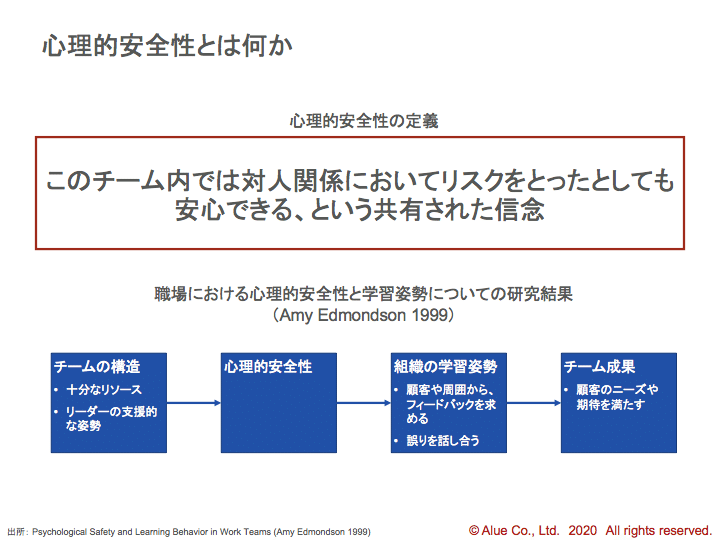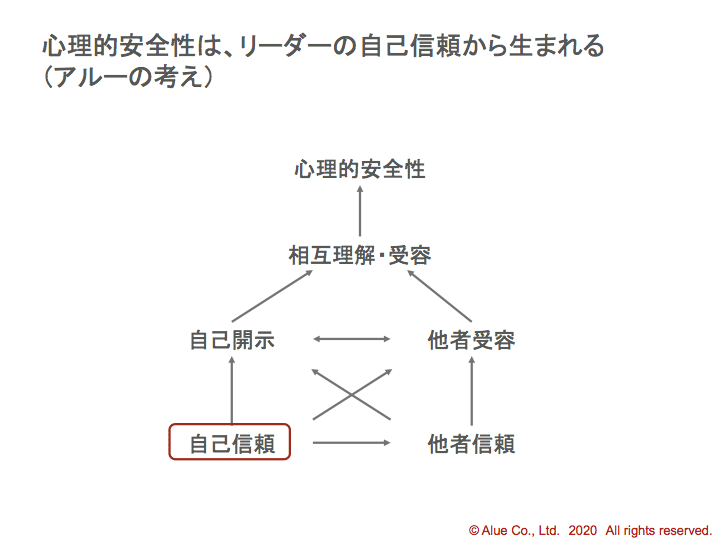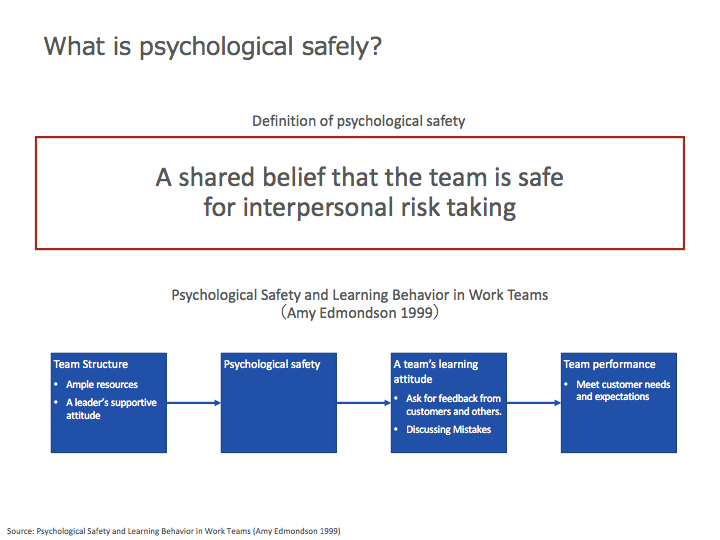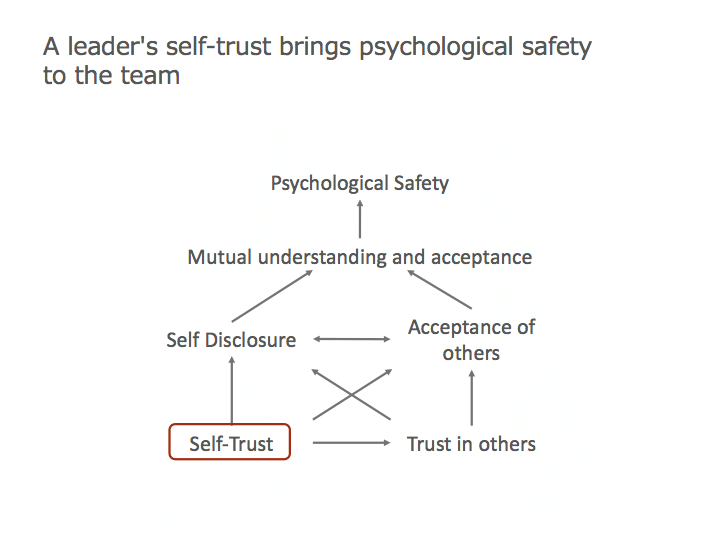
リーダーの自己信頼が、チームに心理的安全性をもらたす
前回の記事では、自己信頼が、人との「横の関係性」を育み、自分は自分らしく、他者もその人らしくいられるようになるということをお話ししました。
今回の記事では、リーダーの自己信頼がチームに心理的安全性をもたらすということについてお話しします。
心理的安全性とは何か
心理的安全性という概念は、Google社が社内プロジェクトにおいて「効果的なチームの条件とは何か」という問いに対して探求した答えとして、紹介されたことで日本においても知られるようになりました。
Google社のリサーチチームは、この問いに対して、真に重要なのは「誰がチームのメンバーであるか」よりも「チームがどのように協力しているか」であることを突き止め、その中でももっとも根幹をなすものが「心理的安全性」であると結論づけています。(Google社の調査概要はこちら)
ここで心理的安全性の定義を確認しておきましょう。
心理的安全性の定義(Amy Edmondsonの定義):
このチーム内では対人関係においてリスクをとったとしても安心できる、という共有された信念

この定義を読んで、「心理的安全性」という言葉の第一印象と少し違うなと思われた方もいらっしゃるのではないでしょうか。心理的安全性という言葉を聞くと、「そのチームに所属していると、いつも安心・安全を感じられる」というイメージを持たれるのではないでしょうか。チームに所属している人同士の仲が良く、平和な感じであり、争いごとが起きない印象ですね。
しかし、上記の定義においては「対人関係においてリスクをとったとしても安心できる」と記述されています。「いつも安心・安全を感じられる」というイメージであることに間違いはありませんが、「お互いに遠慮して、一線を踏み越えることはしないために、和が成り立っている」というものではなく、「一線を踏み越えたとしても、お互いに安心感を持ち続けることができる」ということを心理的安全性と呼んでいます。
いま、みなさんの職場において、「もっとこうしたら良くなる」と感じることはありますか?少なくとも、1つや2つ、職場における課題や改善点などは思い浮かぶのではないでしょうか。
「対人関係においてリスクをとる」というのは、このような場合に、「職場の課題や改善点を言い出すと、職場の雰囲気が少し気まずくなってしまうかもしれないけど、この職場の人たちであればわかってくれると思うので、勇気をもって伝えてみよう」と思えることを指します。
逆に、「職場の課題や改善点を言い出すのは、誰かの気分を害する可能性があるからやめておこう」とか「職場の和を乱す人とみなされると嫌なのでやめておこう」と思う場合は、「対人関係においてリスクをとりにくい」状態であると言えます。
さて、この心理的安全性はなぜ重要なのでしょうか?
心理的安全性を提唱したハーバード大学のエドモンドソン教授は、心理的安全性は組織の学習姿勢を高め、それがチーム成果に結びつくという研究結果を1999年に発表しました。

すなわち、心理的安全性があることで、チームとして成長できるということです。心理的安全性があることによって、多角的に物事を捉えて話し合うことができたり、チームの問題を率直に話して改善することができたり、既成概念にとらわれずに新しい発想を取り入れることができたりすることで、チームとしてのパフォーマンスが高まるということは容易に想像できます。
逆に、問題だと思っていてもチーム内で言い出すことができなかったり、役職者の意見が絶対であり他のメンバーが口を挟む余地がなかったりすると、チーム学習が進まずに、チームとしての成果が出にくくなるということを実際に経験された方も少なくないでしょう。
私自身も、チームに心理的安全性をもらたすことができているかと問われれば、まだまだできていないというのが実情です。心理的安全性のあるチームを作りたいと思っていても、場面によって自分のエゴがでてしまったり、社長という役職からくる背負い感が裏目にでてしまったり、和を乱すような発言をするメンバーに懐疑的な思いを抱いてしまったり、まだまだ具現化できていません。
このように、心理的安全性は、効果的なチームを生み出すために重要なことということは理解できても、それを具現化することは一筋縄ではいきません。心理的安全性のあるチームを作りたいと思うことは大切ですが、思ったからといって、それがすぐに実現するわけではありません。
それでは、心理的安全性は何によってもたらされるのでしょうか?
自己信頼が心理的安全性をもたらす
ここから書く内容は、オーソライズされた研究結果ではなく、意識の意識化の探求プロジェクトの中で生み出された仮説になります。ただ、個人的にはかなり納得感が高く、日々の実践を通じてその確信度合いは高まっています。
我々の探求プロジェクトにおける答え(仮説)は「自己信頼が心理的安全性をもたらす」というものでした。

私たちが考える「心理的安全性が生み出される機序」は次のようなものです。
以前の記事で、自己信頼は他者信頼を生み出すということについてお話ししました。自分を無条件に信じることが、他者を無条件に信じることにつながります。逆に言えば、自分の条件付きでしか信じられないと、他者も条件付きでしか信じることができません。
自己信頼があると、自己開示をすることができます。自分を無条件に信じることができれば、自己開示に躊躇する必要がなくなります。自分の弱みであったり、課題であったり、誤りであったり、通常では言いにくいとされることであっても、自分に対する無条件の信頼があれば、このようなことを自己開示することの抵抗感は少なくなります。
また、他者信頼があると、他者受容をすることができます。他者を無条件に信じることができれば、他者のあり方や振る舞いや言動を、良い悪いという判断を保留して、受容することができます。
また、自己開示と他者受容は、相互に影響を及ぼします。自己開示が進むほど、他者のことも受容しやすくなるというのは、仲がいい友達、気のおけない仲間などを思い浮かべていただけると容易に想像できるではないでしょうか。
そして、自己開示と他者受容が進むと、相互受容・相互理解が進み、その関係性に心理的安全性が生まれてきます。
リーダーの自己信頼が大切
心理的安全性は、チームで共有された信念ですから、それを生み出す元となるのはチームメンバーの一人ひとりです。その意味においては、各チームメンバーの自己信頼がチームの心理的安全性に寄与します。
その中でも、リーダーとしての役割を担う人の自己信頼が大切であると私は考えます。リーダーのあり方や振る舞いがチーム全体に与える影響は大きいからです。
ですから、みなさんがリーダー的な役割でチームを率いている場面があれば、「自分の自己信頼が、チーム全体の心理的安全性をもたらす」ということを意識すると良いと思います。
リーダーではなく一人のメンバーとしてチームに参画している場面においては「(リーダーの自己信頼だけではなく)自分の自己信頼も、チーム全体の心理的安全性をもたらす」と捉えることをお勧めします。
「あれ?リーダーの自己信頼が大切なのだから、チームメンバーとして参加している場合は、自分はあまり関係ないのではないか」と思われる方もいらっしゃるかもしれません。おっしゃる通り、リーダーとしての自己信頼の影響度合いの方が高いですが、先ほど述べたように各メンバーの自己信頼も影響を与えます。
ですから、自分によって変えることができることに意識を向けるという意味において、自分を主語にして「自分の自己信頼も、チーム全体の心理的安全性をもたらす」と捉えることをお勧めしています。
「自分はあまり影響を与えないから関係ない」というスタンスではなく「自分もチームに影響を与えうる一員である」というスタンスや、「仮に自分がリーダーの役割だったら、どのように振る舞うか」を考えるというスタンスで日頃から取り組んでいる人が、周囲から陰に陽に推薦されてリーダー的役割をそのうち担うようになるという事例をみなさんも見たことがあるのではないでしょうか。
なぜ、心理的安全性を生み出そう、だけでは不十分なのか
ここで「なぜ、わざわざ自己信頼という概念を持ち出して、心理的安全性との関係を説明する必要があるの?」という疑問を持たれた方もいらっしゃるかもしれません。おっしゃる通り、心理的安全性があれば効果的なチームになるのであれば、心理的安全性を生み出すことだけを考えればいいというのも一理あります。
それでも、「自己信頼が心理的安全性を生み出す」ということを意識しておく重要性があると私は考えます。それは、自己信頼が原因であり、心理的安全性が結果であると考えるからです。
先ほど、私自身の話として、「心理的安全性のあるチームを作りたいと思っていても、まだまだ具現化できていない」ということをお伝えしました。その状況においてしみじみと感じることは、原因となる部分(自己信頼)が変わらなければ、結果としての状態(心理的安全性)も簡単には変わらないということです。
私自身の場合は、元々、自己信頼が弱い人間でした。それを少しずつ克服しつつあるように思っていますが、また途上です。自分の自己信頼の程度に応じて、チームの心理的安全性の度合いは増しているとは思うものの、やはりまだ十分な水準とは言えません。それは、自分の自己信頼がまだ十分に醸成されていないからだと考えています。
とはいっても、悲観的に考える必要は全くないと思っています。これまでの記事でお伝えしたように、自己信頼は醸成することができるものだからです。自己信頼は、自己一致(メタ意識から、直感、思考、身体意識をありのままに捉えること)の積み重ねによって培われていきます。
自己一致
(メタ意識から、直感、思考、身体意識をありのままに捉えること)
↓
自己信頼
(自分を無条件に信じること)
↓
チームの心理的安全性
↓
チームの学習促進
↓
チームの成果
ここまでお話ししてきたことをまとめると上図のようになります。自己一致の積み重ねが、心理的安全性を生み出し、チームの成果をもたらします。そして、重要なことは、自己一致は、いつでもどこでも、自分がやろうと思えばできるということです。

私自身、自己信頼が心理的安全性をもたらすということに気づいてから、チームでの協働や、周囲との関係性構築がとても楽になりました。そのような協働や関係性構築がうまくいくこともあれば、うまくいかないことも現実にはありますが、どんな状況であっても、「自己信頼がベースになっている」ことや「自己一致の積み重ねで、状況は改善していくことできる」と信じられることで、自分が集中して取り組むべきこと、意識するべきことが明確になったからです。
今回は、自己信頼が心理的安全性を生み出すという話をいたしました。職場で会議の場面、部下との1on1を行う場面、家族との会話の場面など、1日の中で協働する場面やコミュニケーションをとる場面はたくさんあると思います。そのような場面で、「自己信頼が心理的安全性を生み出す」ということを意識しながらその場に臨んでみると、これまでとは少し違う感覚を得ることができるかもしれません。
本日の問いとなります。(よろしければ、コメントにご意見ください)
・あなたにとって、心理的安全性を感じるチームはどのようなものですか?そのチームにおけるあなたの振る舞いや言動は、他のチームにおけるあなたとどのような違いがありますか?
・先ほどのチームにおいて、そのチームのリーダー的立場の人や、メンバーの人の自己信頼と、心理的安全性にはどのような関係がありそうですか?あるいは、なさそうですか?
A leader's self-trust brings psychological safety to the team
In my previous article, I talked about how self-trust fosters "horizontal relationships" with people, allowing us to be true to ourselves and others to be true to them.
In this article, I will talk about how a leader's self-trust brings psychological safety to the team.
What is psychological safety?
The concept of psychological safety became well known in Japan when Google introduced it as an answer to the question, "What makes an effective team?"
In response to this question, Google's research team found that what really matters is not "who is on the team" but rather "how the team works together" and concluded that the most fundamental aspect of this is "psychological safety". (Click here for a summary of Google's study)
Let's review the definition of psychological safety here.
Definition of psychological safety (Amy Edmondson's definition):
A shared belief that the team is safe for interpersonal risk taking
Reading this definition, some of you may think that it is a little different from your first impression of the term "psychological safety." When we hear the term "psychological safety," we may think that we always feel safe and secure when we belong to that team. It's the impression that the people in the team are friendly and peaceful, and that there is no conflict.
However, in the above definition, it is described as being able to feel safe even when taking risks in interpersonal relationships. There is no doubt that this is the image of always feeling safe and secure, but it does not mean that the harmony is established because both parties are reserved and do not step over the line, but rather that both parties can continue to feel safe even if they step over the line. This is what is called psychological safety.
Is there anything in your workplace that you feel could be improved? You probably can think of at least one or two issues or areas for improvement in your workplace.
Taking a risk in interpersonal relationships means to be able to say, "If I tell people about the problems and improvements in the workplace, it might make the atmosphere in the workplace a little awkward, but I think the people in this workplace will understand, so I'll be brave enough to tell them"
In contrast, if one thinks, "I don't want to talk about issues or improvements in the workplace because it might offend someone," or "I don't want to do it because I don't want to be seen as someone who will disrupt the harmony of the workplace," then it would be difficult to take risks in interpersonal relationships.
Now, why is this psychological safety important?
Professor Edmondson of Harvard University, a proponent of psychological safety, published a study in 1999 showing that psychological safety increases the learning attitude of teams, which in turn leads to better team performance.

In other words, psychological safety allows us to grow as a team. It is easy to imagine that this is because psychological safety allows us to see and discuss things from multiple perspectives, to talk openly about team problems and improve them, and to incorporate new ideas outside of the box, which enhances our performance as a team.
In contrast, many of you may have actually experienced that if you cannot speak up within the team even if you think it is a problem, or if the opinion of the person in charge is absolute and there is no room for other members to speak up, team learning will not proceed and it will be difficult to achieve successful outcomes as a team.
If I were to ask myself whether I have been able to bring psychological safety to my team, I would say that I have yet to do so. Even though I would like to create a team with psychological safety, I have yet to realize it because I let my ego get the better of me in some situations, a sense of responsibility from my position as president often backfires on me, and I am sometimes skeptical of members who make comments that disturb the harmony.
As we can see, even if we understand that psychological safety is important for creating an effective team, it is not a simple matter to materialize it. It's important to want to create a psychologically safe team, but that doesn't mean it will happen immediately.
Then, what brings about psychological safety?
Self-trust brings psychological safety
What I am about to write is not the result of authoritative research, but a hypothesis generated in the course of a project to explore the ISHIKI(Consciousness) management. However, I am personally quite convinced of it, and the degree of my conviction is increasing through my daily practice.
The answer (hypothesis) in our quest project was that self-trust leads to psychological safety.

Our team's idea of the mechanism by which psychological safety is created is as follows.
In a previous article, I talked about how self-trust creates trust in others. Believing in oneself unconditionally leads to believing in others unconditionally. Conversely, if we can only believe conditionally in ourselves, we can only believe conditionally in others.
When we have self-trust, we are able to self-disclose. When we have unconditional trust in ourselves, we don't need to hesitate to disclose. If we have unconditional trust in ourselves, we will feel less resistance to self-disclosure of our weaknesses, challenges, mistakes, and other things that are normally considered difficult to talk about.
When we have trust in others, we are able to accept others. If we can believe in others unconditionally, we can accept their ways of being, their behavior, and their words and actions, suspending our judgment of what is good or bad.
In addition, self-disclosure and acceptance of others have a mutual influence. The more self-disclosure, the easier it is to accept others, as we can easily imagine when we think of a good friend or a reliable comrade.
And as self-disclosure and acceptance of others progress, mutual acceptance and understanding develops, and psychological safety is created in the relationship.
Self-trust of the leader is important
Since psychological safety is a belief shared in a team, the source of this belief is each team member. In this sense, the self-trust of each team member contributes to the psychological safety of the team.
Among them, I believe that self-trust of those who take on the role of a leader is very important. This is because the way a leader is and behaves has a great impact on the entire team.
So, if you are leading a team in a leadership role, it is good to be aware that your self-trust will bring psychological safety to the entire team.
In situations where you are participating in the team as a member rather than a leader, it is recommended that you view your own self-trust (as well as the leader's self-trust) as providing psychological safety for the entire team.
You may be thinking that since self-trust of the leader is important, if you are participating as a team member, you are not really relevant to the team. It is true that the degree of influence of self-trust as a leader is higher, but as I mentioned earlier, the self-trust of each member also has an influence.
Therefore, in terms of concentrating on what can be changed by you, I recommend that you regard yourself as the subject and that your self-trust will also bring psychological safety to the entire team.
I'm sure you've seen cases where people who take the attitude that they can influence the team and think about how they would behave if they were in the role of a leader have been recommended by others to take on leadership roles in the future.
Why "Let's create psychological safety" is not enough?
Some of you may be wondering why we need to bring up the concept of self-trust and explain its relationship to psychological safety. It is reasonable to say that if psychological safety makes for an effective team, then we only need to think about creating psychological safety.
Nevertheless, I believe it is important to be aware of the fact that self-trust creates psychological safety. This is because I believe that self-trust is the cause and psychological safety is the result.
Earlier, I told you about my own story of wanting to create a team with psychological safety, but not being able to realize it yet. In this situation, what I feel deeply is that if the cause (self-trust) does not change, the result ( psychological safety) will not change easily.
In my own case, I was originally a person with weak self-trust. I think I am gradually overcoming this, but I am still in the process of doing so. I believe that the degree of psychological safety of the team is increasing in proportion to the degree of my self-trust, but it is still not at a sufficient level. I believe that this is because my self-trust has not yet been fully developed.
However, I don't think we need to be pessimistic at all. As I have mentioned in my previous articles, self-trust is something that can be cultivated. Self-trust is cultivated through the accumulation of self-consistency.(To capture intuition, thinking, and bodily awareness as they are from meta-consciousness)
Self-consistency
(To capture intuition, thinking, and bodily awareness as they are from meta-consciousness)
↓
Self-trust
(Unconditional trust in oneself)
↓
Psychological safety of the team
↓
Facilitate team learning
↓
Team performance
The above figure summarizes what we have talked about so far. The accumulation of self-congruence creates psychological safety and team performance. And the important thing is that self-congruence can be done anytime, anywhere, if we want to do it.
Since I realized that self-trust brings psychological safety, it has become much easier for me to collaborate with my team and build relationships with the people around me. Sometimes such collaboration and relationship building goes well, and sometimes it doesn't, but no matter what the situation is, being able to believe that " self-trust is the base" and that "the situation can be improved by accumulating self-congruence" has made me crystal clear on what I need to focus on and what I need to be aware of.
In this article, I talked about how self-trust creates psychological safety. There are many situations in which we collaborate and communicate in a day, such as meetings at work, 1-on-1 sessions with subordinates, and conversations within the family. In such situations, if you approach the situation with the awareness that "self-trust creates psychological safety," you may find yourself feeling a little differently than before.
Here are the quests of the day. (If you'd like, please share your thoughts in the comments.)
・What kind of team makes you feel psychologically safe? How does your behavior and actions on that team differ from your behavior on other teams?
・In the team you just described, what seems to be the relationship between the self-trust of the people in leadership positions and the members of the team and the psychological safety within the team?
Bunshiro Ochiai
この記事が気に入ったらサポートをしてみませんか?
